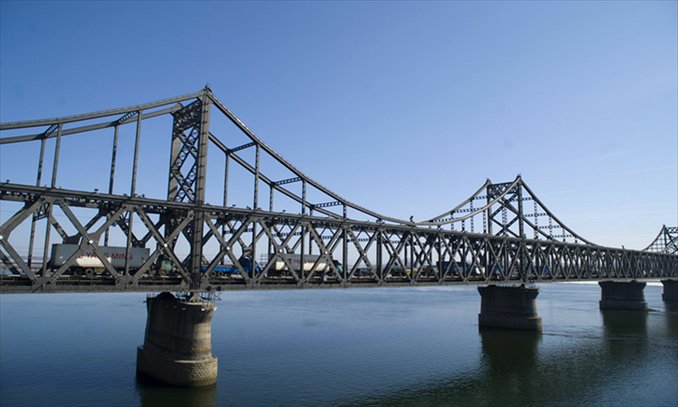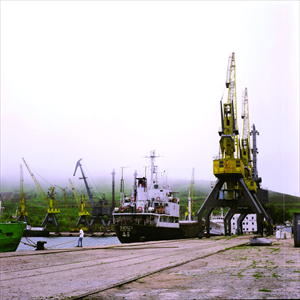HOME >> CHINA
Dealing with comrades
By Feng Shu Source:Global Times Published: 2012-8-29 21:25:03

From North Korea, many trucks fully loaded with seafood, clothes and minerals drive into China while traders take food, oil and other daily necessities the other way to meet Korean needs.
"This country is more open to China today. Ten years ago, only around 50 trucks were allowed to go across the border a day. Ten times more cross daily now," said Ji Huiqin, chairman of Yunda Knitwear Clothing Co., who started to do business in Rason in 2004.
With a total investment of more than 10 million yuan in four clothing factories in North Korea, Ji's company used to be the biggest exporter and trader in Hunchun but she is beginning to feel the squeeze from her Chinese counterparts.
For Ji, the incentive to invest in North Korea has always been the cheap labor market. But regarding bilateral trade, the biggest attraction of the North Korean market today is still the rich mineral resources that North Korea itself does not have the ability to explore.
Meanwhile, China sees a growing demand for energy behind its rapidly running economic engine. "About 70 percent of China's investment in North Korea is concentrated on the exploration of mineral resources," a report by Korea Development Bank of South Korea reads.
"The two countries are strongly complementary, we need their resources, and they need our light industry products and food," commented Zhang Huizhi, the deputy director of the Northeast Asian Studies Academy of Jilin University.
Investment risks
China Minmetals Corporation broke the ice in 2004 as the first Chinese enterprise to enter North Korea's energy industry. It was granted the right to explore for coal from North Korea's largest coal mine company, Yongtung Coal Mine. Since then, many Chinese enterprises have followed suit. A year later, Wanxiang Group, China's largest auto parts maker, purchased a 51 percent stake in a copper mine with claimed reserves of 250,000 tons. From 2006 to 2007, North Korea sold the exploration rights of 10 mines to Chinese companies.
However, despite China's status as the main aid donor to North Korea, doing business remains unpredictable, and contradictory stories can often be heard behind Chinese investments in North Korea.
With news that Baoyuan Hengchang International Trade Co. Ltd has recently secured the rights to three mines in North Korea, Xiyang Group from Liaoning Province has reported a huge loss of 240 million yuan in a North Korean iron mine, which remained the biggest investment project by Chinese enterprises in the country.
From 2007 to 2011, Xiyang Group spent more than four years to build a modern concentrating mill and produced a total of 30,000 tons of high purity iron ore. However, North Korea suddenly and unilaterally tore up the contract in February this year, saying the Chinese partners had violated the contract and forcefully deported the last 10 Xiyang Group employees this March.
On Xiyang's official Weibo, the company called the five-year investment in North Korea a "nightmare."
"Just overnight, all of Xiyang Group's assets in North Korea were forcibly taken over by North Korea," read a 6,000-word blog post, in which, the company unveiled fraud on the Korean side. Phone calls to Xiyang Group by the Global Times went unanswered. Xiyang's case is absent from the official website of the North Korea Investment Office.
"The negative effect of this case is like a tsunami, which has seriously damaged North Korea's reputation," Cao, a representative of a North Korean trade agency in Hunchun, told the Global Times. Being Chinese, Cao admits that it is hard for him to give advice to anyone who are interested in investing in North Korea. "This is a country full of uncertainties," Cao stated.
The Xiyang case might be the most eye-catching due to the huge financial losses involved, but it's far from being an individual one.
"I lost more than 2 million yuan in North Korea for no reason. After our equipment had arrived there, we were prevented from opening a factory, which had already been agreed in the contract we had signed earlier. They then refused to return the equipment to us. There is no rule to follow when dealing with people there, they could easily turn against a friend," said Ji.
"There is no effective enforcement of laws and regulations regarding foreign investment in North Korea, and the opaque information from North Korean authorities always puts the Chinese investors in a very passive situation," said Zhang from Jilin University. She admitted that in most situations, Chinese enterprises have no way to complain or seek arbitration, not to mention compensation, when disputes occur.
Wu, a businessman in the Chinese border town of Yanji in Jilin Province, said instability inside North Korea also exposed the Chinese investors to many risks. "The partner or person in charge of a joint-project from the North Korean side can change at any time," he said, adding that they have to sign every deal with the North Korean government.
"A successful investment still largely relies on a mature market, but North Korea still has a market with high political and policy risks. It's so changeable," said Zhou Dewen, chairman of the Wenzhou Association of Small and Medium-sized Enterprises.
Despite many business opportunities there, Zhou said, most entrepreneurs from Wenzhou, a city well-known for its adventurous business figures, still take a wait-and-see attitude toward investing in North Korea.

Making it safer
But overall, in the face of widened sanctions against North Korea by the international community, and the suspension of economic cooperation with South Korea, bilateral trade between China and North Korea has seen a steady increase.
According to customs statistics, China-North Korea trade reached a record high of $5.67 billion in 2011, a 62 percent increase year-on-year. This momentum had continued this year, with bilateral trade reaching $3.14 billion in the first half of the year.
It is believed that China now takes up more than 70 percent of North Korea's foreign trade, with Russia probably taking up most of the rest, according to a report by the Wall Street Journal.
"China-North Korea trade is booming right now, when most other countries are closing off their door with the country. North Korea has to enlarge its business cooperation with China so as to maintain its domestic economy," said Zhang.
The city of Dandong, with its coastline along the 1,334-kilometer Chinese border with North Korea, is a strong example of this. Around 500 of the 800 trade companies based there were devoted to trading with North Korea by the end of 2011.
"According to our estimate, the trade value between Dandong and North Korea takes up around 40 percent of the total business between the two countries, while the trade completed at Dandong ports accounts for nearly 80 percent," said Gao Mingxiong, the spokesperson of the Dandong Foreign Economic and Trade Bureau.
As the city directly faces the North Korean islands of Hwanggumphyong and Wihwa as well as having a land bridge to the island of Hwanggumphyong, Gao expects the city to see more development opportunities in the future. The chance of this is increased by both the Rason Economic and Trade Zone and the Hwanggumphyong and Wihwa Islands Economic Zone now in a stage of substantial development.
Jointly developed by both China and North Korea, the Rason zone is expected to be built up as a manufacturing industry base, while the Hwanggumphyong and Wihwa Islands zone is set to focus on new industries. But the key goal is to make them a safe harbor for Chinese enterprises, to help bring more Chinese investments to North Korea.
"The laws and regulations the economic zones should be recognized and respected by both countries, to give better protection to the Chinese enterprises," Gao reasoned. "The two zones can serve as a jumping pad for Chinese enterprises to prepare for future investment inside North Korea, and a pilot program to encourage change on North Korea in the long run," Gao added.
"We need to support Chinese companies who have the capacity and willingness to expand trade with North Korea, so as to push forward the two sides to further improve bilateral trade and investment structure, and in the end, discuss the possibilities of cooperation in big projects," China's deputy commerce minister Chen Jian wrote in People's Daily on August 14.
Reform not yet clear
Insiders agree that North Korea is showing signs that the young Kim Jong-un is trying to improve livelihoods and the domestic economy. He is also pushing for a plurality of foreign trade with Russia, Southeast Asia, and even South Korea and the US.
It is still hard to tell whether North Korea will finally adopt market reform, and too early to say whether the two economic zones built with China will help set a direction for such future reform beyond North Korea's border areas.
However, experts say there is reason to expect a better investment environment inside North Korea.
"As the foundation of North Korea's economic development remains weak, it has to rely on foreign trade to develop. Only several projects in the two zones are far from enough. In this sense, improving the overall investment environment is a must," said Zhang.
However, Ji maintains a bleak outlook toward her Korean factories in the next four or five years.
"People like us in the labor-intensive industries cannot be optimistic in the long-term. North Korea's opening-up might see a service industry develop, and the country will no longer be our cheap manufacturing base," Ji said, adding that she has no plans to expand her business in the future.
Posted in: In-Depth